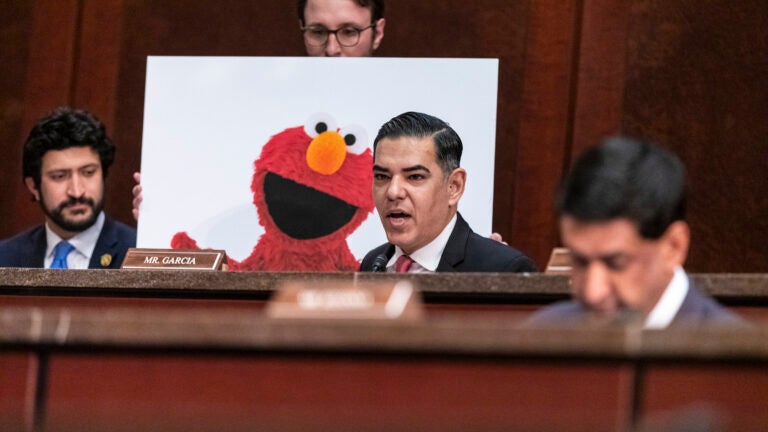A proposal before the Senate to strip funding from the Corporation for Public Broadcasting could be catastrophic for local stations, particularly those in rural areas.

Rep. Robert Garcia, Democrat of California, at a hearing on federal funding for NPR and PBS in March. Supporters of public broadcasting point to educational programming like “Sesame Street.” Anna Rose Layden / The New York Times
July 14, 2025 | 11:45 AM
3 minutes to read
More than a half-century ago, the federal government took a big step toward the media business when President Lyndon Johnson signed the Public Broadcasting Act into law.
Because of that bill, PBS, NPR and other public broadcasters in the United States receive more than $500 million annually from the government-funded Corporation for Public Broadcasting.
That support is now hanging in the balance. The Senate is planning to vote this week on a proposal to strip the funding for the Corporation for Public Broadcasting, a move that could be catastrophic for radio and TV stations across the country.
Here’s what you need to know.
Would NPR and PBS survive?
Yes. NPR gets about 2% of its annual budget directly from federal grants, including from the Corporation for Public Broadcasting; for PBS, that amount is about 15%. Both organizations also get federal money indirectly, through payments from member stations across the country that receive government funding, though it’s difficult to estimate precisely how much.
The real pain will be felt by local stations in far-flung locations like Unalakleet, Alaska, and Pendleton, Oregon. Those broadcasters often rely disproportionately on federal grants for their operations because of a funding formula that takes into account the fact that they have fewer donors and programming sponsors.
What about local stations?
An internal NPR report from 2011 obtained by The New York Times said that if Congress cut off funding to the public radio system, up to 18% of the roughly 1,000 member stations would close, with broadcasters in the Midwest, South and the West affected the most. Nationwide, up to 30% of listeners would lose access to NPR programming.
For PBS, local TV stations would also bear the brunt of the cuts. And popular programs like “PBS NewsHour” and “Nature” might need to find money elsewhere, such as from donations or syndication.
What’s the argument for defunding NPR and PBS?
Critics of public broadcasters argue that the media organizations have a liberal bias that taxpayers should not have to support.
Uri Berliner, a former senior editor at NPR, argued in an essay last year that journalists at the public radio network had “coalesced around the progressive worldview,” faulting its coverage of stories such as the controversy surrounding the laptop of then-President Joe Biden’s son, Hunter.
Some Republican lawmakers, such as Rep. Marjorie Taylor Greene of Georgia, have argued that widespread internet access has made news coverage from rural stations increasingly unnecessary.
Some Republican critics of PBS have taken issue with content that they believe is too focused on issues of race and gender. Those concerns were aired during a congressional hearing this spring when lawmakers grilled Katherine Maher, CEO of NPR, and Paula Kerger, CEO of the Public Broadcasting Service.
What’s the argument for keeping government funding intact?
Proponents of public radio and TV in the United States argue that the organizations provide essential, free and in some cases lifesaving information for Americans across the country for little cost to taxpayers.
In some places, including remote locations that could be most affected by the cuts, public media is one of the only sources of local news.
In addition to news programs like “All Things Considered” and “Morning Edition” on NPR, public broadcasting advocates are quick to extol the power of educational programs like “Sesame Street” and “Daniel Tiger’s Neighborhood.”
Defenders of public broadcasting also underscore the virtues of vigorous journalism aired by PBS — programs like “Frontline” and “PBS NewsHour” — and investigations published by NPR, such as a recent deep dive into the Trump administration’s impact on the federal health care budget.
What will happen next?
The Senate must act on the proposal to cut the funding, known as a rescission request, by Friday; the House has already approved it. If the measure passes, the Corporation for Public Broadcasting will no longer be able to make grants after September.
If the rescission is enacted, it would probably not seriously affect any local radio and TV stations until this fall, when the next payment from the Corporation for Public Broadcasting fails to arrive.
This article originally appeared in The New York Times.
Sign up for the Today newsletter
Get everything you need to know to start your day, delivered right to your inbox every morning.
